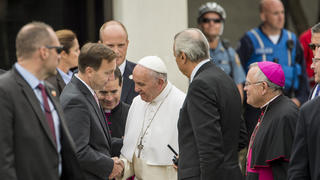Celebrating Five Years of Pope Francis: People, Mercy, Dialogue
Tuesday, March 13, marks the fifth year of the papacy of Pope Francis. Saint Joseph's University experts reflect on the meaning and power of the first Jesuit pope's contributions to Catholicism and the global community.
 University President Mark C. Reed, Ed.D., greets Pope Francis on campus, Sept. 27, 2015.
University President Mark C. Reed, Ed.D., greets Pope Francis on campus, Sept. 27, 2015.
On March 13, 2013, the world awaited news from the papal conclave that would reveal the identity of the next leader of the Catholic Church. To almost global surprise, Cardinal Archbishop Jorge Mario Bergoglio of Buenos Aires was named pope.
His Holiness claims a number of “firsts” in papal history: He is the first pope from the Americas, the first to take the name Francis, and the first member of the Society of Jesus, also known as the Jesuits, to inhabit the Holy See.
Pope Francis visited Saint Joseph’s campus during his 2015 American tour, where he was reunited with his longtime friend Rabbi Abraham Skorka. Their relationship is embodied in the University’s sculpture, Synagoga and Ecclesia in Our Time, which commemorates Nostra Aetate, the Vatican II document that transformed the relationship between the Catholic Church and other religions, most especially with Judaism.
As Pope Francis’s papacy reaches the five-year mark, experts from Saint Joseph’s, one of the nation’s 28 Jesuit universities, reflect on what makes his ministry uniquely Jesuit, and the meaning and power of his contributions to Catholicism and the global community.
Daniel Joyce, S.J. '88, executive director of Mission Programs, says Pope Francis challenges people to use their talents for good.
“Pope Francis gently, but powerfully, asks believers to be mature discerners. He respects the faith-life of people and suggests that they prayerfully consider the teachings and spirituality of the Catholic faith to make their own decisions. Leading by example, his simplicity of life and constant reaching out to the excluded has challenged everyone to live differently. He keeps asking the question: 'What about you?' The call to every person to discern and use their talents for the highest good is one of his most effective messages. His greatest achievement so far may be that he gets people to think about putting love in action.”
Papal historian and expert William Madges, Ph.D., professor of theology, says Pope Francis resembles early Jesuits.
“As pope, Francis beautifully embodies the charism that animated the first Jesuits, whose primary mission was to ‘help’ or ‘care’ for souls. By this, they meant to help individuals experience the love of God, adopt right sentiments, and live according to them (such as performing the spiritual and corporal works of mercy). Pope Francis’s papacy has been characterized by a consistent and strong commitment to a theology of mercy. As a ‘companion of Jesus,’ Francis teaches and puts into practice the welcoming and tender embrace of God, revealed in and through the ministry of Jesus. What is most essential and necessary, he said, is pastoral care that helps people experience the love and mercy of God. Through Francis’s ministry, many people have come to experience the Church as a community that truly reflects the ministry of Jesus — a community that is more inclusive, more welcoming, and more loving.”
Interfaith scholar Philip A. Cunningham, Ph.D., professor of theology, director of SJU’s Institute for Jewish-Catholic Relations, says that to Pope Francis, the well being of people is more important than almost anything else.
“When I think of Pope Francis, three words come to mind: people, mercy and dialogue.
For Francis, the well-being of people — whether physical, economic, personal or spiritual — is more important than almost anything else. This echoes the Jesuit stress on cura personalis, the care of the whole person, and is why Francis speaks of the church as a ‘field hospital’ that heals people’s wounds. It is also why he sees the virtue of mercy as of paramount value. To him, God is a God of mercy, and therefore disciples of Christ Jesus must be more concerned about extending mercy to people than seeking power or dominance.
Pope Francis believes that the solution to most human conflict is 'dialogue, dialogue, dialogue,' as he said when addressing a political controversy in Latin America. He has had a special experience in engaging in interreligious dialogue with Jews, especially his friend Rabbi Abraham Skorka, who will be a University Professor at SJU beginning in the fall 2018. In his first Apostolic Exhortation, Francis observed that '… dialogue and friendship with the children of Israel are part of the life of Jesus’ disciples.' His pursuit of dialogue as requiring people to open the doors of their hearts and offer warmth has endeared him to people all over the world.”
Jewish studies scholar Adam Gregerman, Ph.D., assistant professor of religious studies and assistant director of the Institute for Jewish-Catholic Relations, admires Pope Francis’s commitment to interfaith relations.
Pope Francis has continued the remarkable trajectory toward improved Catholic-Jewish relations begun at the Second Vatican Council. There is much to celebrate about this new relationship, and Francis’s deep commitment to it. He has impressed many in the Jewish community with both small gestures (such as his visit to Jerusalem's Western Wall) and path-breaking statements (such as recent Vatican documents and papal speeches). He evinces a palpable sense of respect and warmth toward the Jewish community, shaped by decades of interaction with the Jews of Argentina, including with his friend, colleague and co-author of On Heaven and Earth, Rabbi Abraham Skorka.”
